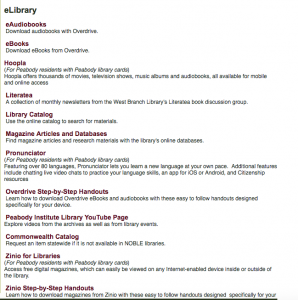The Library is closed today, dear readers, but we’ll be open tomorrow to help you with all your literary, audio, visual, and technological-related needs before the long weekend (hooray!). There’s been a bumper-crop of new books being released into the wild over the past few weeks, so let’s lose no time in savoring all the lovely books that have waltzed their way onto our shelves this week!
And whatever you celebrate, from Easter to Passover, to gardening, to sunshine, to staying in bed for a few extra minutes/hours, we wish you a very peaceful and fulfilling weekend!

 Long Black Veil: Jennifer Finney Boylan’s newest book has been drawing a number of comparisons to Megan Abbott, Donna Tartt, and, most impressively, Shirley Jackson. On a warm August night in 1980, six college students sneak into the dilapidated ruins of Philadelphia’s Eastern State Penitentiary, looking for a thrill. With a pianist, a painter and a teacher among them, the friends are full of potential. But it’s not long before they realize they are locked in—and not alone. When the friends get lost and separated, the terrifying night ends in tragedy, and the unexpected, far-reaching consequences reverberate through the survivors’ lives. As they go their separate ways, trying to move on, it becomes clear that their dark night in the prison has changed them all. Decades later, new evidence is found, and the dogged detective investigating the cold case charges one of them—celebrity chef Jon Casey— with murder. Only Casey’s old friend Judith Carrigan can testify to his innocence. But Judith is hiding secrets of her own–secrets that could destroy the life she’s built since that haunting night. Boylan’s first foray into fiction is winning praise from readers and reviewers alike, with Publisher’s Weekly calling it a “madcap thriller full of hidden identities…And embedded in the whodunit is a heartwarming midlife love story, in which hard-won candor, tenacity, and a generous sense of humor are the most saving of graces.”
Long Black Veil: Jennifer Finney Boylan’s newest book has been drawing a number of comparisons to Megan Abbott, Donna Tartt, and, most impressively, Shirley Jackson. On a warm August night in 1980, six college students sneak into the dilapidated ruins of Philadelphia’s Eastern State Penitentiary, looking for a thrill. With a pianist, a painter and a teacher among them, the friends are full of potential. But it’s not long before they realize they are locked in—and not alone. When the friends get lost and separated, the terrifying night ends in tragedy, and the unexpected, far-reaching consequences reverberate through the survivors’ lives. As they go their separate ways, trying to move on, it becomes clear that their dark night in the prison has changed them all. Decades later, new evidence is found, and the dogged detective investigating the cold case charges one of them—celebrity chef Jon Casey— with murder. Only Casey’s old friend Judith Carrigan can testify to his innocence. But Judith is hiding secrets of her own–secrets that could destroy the life she’s built since that haunting night. Boylan’s first foray into fiction is winning praise from readers and reviewers alike, with Publisher’s Weekly calling it a “madcap thriller full of hidden identities…And embedded in the whodunit is a heartwarming midlife love story, in which hard-won candor, tenacity, and a generous sense of humor are the most saving of graces.”
 No One Is Coming to Save Us: And speaking of impressive comparisons, Stephanie Powell Watts’ debut has been drawing comparisons to The Great Gatsby, and that is no mean feat. In this story, JJ Ferguson has returned to his roots in Pinewood, North Carolina, to build his dream house and to pursue his high school sweetheart, Ava. But with the furniture factories of his childhood in decline, and the area’s latent racism becoming increasingly visible and unsettling, Ferguson begins to wonder if he can ever find the place he left behind. JJ’s return—and his plans to build a huge mansion overlooking Pinewood and woo Ava—not only unsettles their family, but stirs up the entire town. The ostentatious wealth that JJ has attained forces everyone to consider the cards they’ve been dealt, what more they want and deserve, and how they might go about getting it. This is a book that captures the hope, heartbreak, and beautiful humanity, nestled in a part of America that is bleakly believable and hauntingly real. Kirkus Reviews gave this book a starred review, saying “Watts spins a compelling tale of obsessive love and dashed dreams…Watts’ gently told story, like Fitzgerald’s, is only superficially about money but more acutely about the urgent, inexplicable needs that shape a life.”
No One Is Coming to Save Us: And speaking of impressive comparisons, Stephanie Powell Watts’ debut has been drawing comparisons to The Great Gatsby, and that is no mean feat. In this story, JJ Ferguson has returned to his roots in Pinewood, North Carolina, to build his dream house and to pursue his high school sweetheart, Ava. But with the furniture factories of his childhood in decline, and the area’s latent racism becoming increasingly visible and unsettling, Ferguson begins to wonder if he can ever find the place he left behind. JJ’s return—and his plans to build a huge mansion overlooking Pinewood and woo Ava—not only unsettles their family, but stirs up the entire town. The ostentatious wealth that JJ has attained forces everyone to consider the cards they’ve been dealt, what more they want and deserve, and how they might go about getting it. This is a book that captures the hope, heartbreak, and beautiful humanity, nestled in a part of America that is bleakly believable and hauntingly real. Kirkus Reviews gave this book a starred review, saying “Watts spins a compelling tale of obsessive love and dashed dreams…Watts’ gently told story, like Fitzgerald’s, is only superficially about money but more acutely about the urgent, inexplicable needs that shape a life.”
 The Ashes of London: Andrew Taylor is a master of twisty, controversial mysteries, and his ability to create a historic setting is pretty darned impressive. Now, he turns those powers to creating London in September 1666, during The Great Fire that destroyed, and, eventually, revolutionized the city. Amidst this horror, where even the impregnable cathedral of St. Paul’s is engulfed in flames, stands Richard Marwood, son of a disgraced printer, and reluctant government informer. In the aftermath of the fire, a semi-mummified body is discovered in the ashes of St. Paul’s, in a tomb that should have been empty. The man’s body has been mutilated and his thumbs have been tied behind his back – the sign of a Regicide, one of those who signed Charles I’s death warrant during the English Civil War some two decades earlier. Under orders from the government, Marwood is tasked with hunting down the killer across the devastated city. But at a time of dangerous internal dissent and the threat of foreign invasion, Marwood finds his investigation leads him into treacherous waters – and across the path of a determined, beautiful and vengeful young woman. British reviewers loved Taylor’s newest book, with the Financial Times saying that he “presents a breathtakingly ambitious picture of an era … the multiple narrative strands are drawn together in a brilliantly orchestrated finale”, and readers on this side of the proverbial pond are sure to love it, as well!
The Ashes of London: Andrew Taylor is a master of twisty, controversial mysteries, and his ability to create a historic setting is pretty darned impressive. Now, he turns those powers to creating London in September 1666, during The Great Fire that destroyed, and, eventually, revolutionized the city. Amidst this horror, where even the impregnable cathedral of St. Paul’s is engulfed in flames, stands Richard Marwood, son of a disgraced printer, and reluctant government informer. In the aftermath of the fire, a semi-mummified body is discovered in the ashes of St. Paul’s, in a tomb that should have been empty. The man’s body has been mutilated and his thumbs have been tied behind his back – the sign of a Regicide, one of those who signed Charles I’s death warrant during the English Civil War some two decades earlier. Under orders from the government, Marwood is tasked with hunting down the killer across the devastated city. But at a time of dangerous internal dissent and the threat of foreign invasion, Marwood finds his investigation leads him into treacherous waters – and across the path of a determined, beautiful and vengeful young woman. British reviewers loved Taylor’s newest book, with the Financial Times saying that he “presents a breathtakingly ambitious picture of an era … the multiple narrative strands are drawn together in a brilliantly orchestrated finale”, and readers on this side of the proverbial pond are sure to love it, as well!
 The Road to Jonestown: Jim Jones and Peoples Temple: It’s a tricky thing to talk about a book that talks about a cult leader, especially one as notorious as Jim Jones, but Jeff Guinn’s book is so thoroughly researched, and has been getting such high praise from so many diverse quarters, that is seems worth bringing up here. In the 1950s, a young Indianapolis minister named Jim Jones preached a curious blend of the gospel and Marxism. His congregation was racially integrated, and he was a much-lauded leader in the contemporary civil rights movement. Eventually, Jones moved his church, Peoples Temple, to northern California. He became involved in electoral politics, and soon was a prominent Bay Area leader. But there was another side to Jones, and a darker tale of drug addiction, extramarital affairs, and fraud that would culminate in the decision to move his followers to the jungles of Guyana, South America, and, finally, the death of over 900 people who were forced to swallow a cyanide-laced beverage. Guinn brought all his investigative skills to bear on this book, examining thousands of pages of FBI files on the case, traveling to Jones’s Indiana hometown, as well as to the Jonestown site, and working with Jonestown survivors. The result is a book that is troubling, insightful, and already being hailed as the definitive book on Jonestown, with Publisher’s Weekly calling it “Magisterial. . . . Guinn’s exhaustive research, shrewd analysis, and engaging prose illuminate a monstrous yet tragic figure–and the motives of those who lost their souls to him.”
The Road to Jonestown: Jim Jones and Peoples Temple: It’s a tricky thing to talk about a book that talks about a cult leader, especially one as notorious as Jim Jones, but Jeff Guinn’s book is so thoroughly researched, and has been getting such high praise from so many diverse quarters, that is seems worth bringing up here. In the 1950s, a young Indianapolis minister named Jim Jones preached a curious blend of the gospel and Marxism. His congregation was racially integrated, and he was a much-lauded leader in the contemporary civil rights movement. Eventually, Jones moved his church, Peoples Temple, to northern California. He became involved in electoral politics, and soon was a prominent Bay Area leader. But there was another side to Jones, and a darker tale of drug addiction, extramarital affairs, and fraud that would culminate in the decision to move his followers to the jungles of Guyana, South America, and, finally, the death of over 900 people who were forced to swallow a cyanide-laced beverage. Guinn brought all his investigative skills to bear on this book, examining thousands of pages of FBI files on the case, traveling to Jones’s Indiana hometown, as well as to the Jonestown site, and working with Jonestown survivors. The result is a book that is troubling, insightful, and already being hailed as the definitive book on Jonestown, with Publisher’s Weekly calling it “Magisterial. . . . Guinn’s exhaustive research, shrewd analysis, and engaging prose illuminate a monstrous yet tragic figure–and the motives of those who lost their souls to him.”
 The Lowells of Massachusetts: An American Family: Think fast–what’s the address of the West Branch? That’s right…it’s the street named after the Lowells of Massachusetts, a family that settled in “the New World” in the 1600s, and were instrumental in shaping the new nation that emerged in the 1700s. Their prosperity grew as the family became merchants and manufacturers, building prosperity in the 1800s, and scientists and artists flourishing in the 1900s. For the first time, Nina Sankovitch tells the story of this fascinating and powerful dynasty that has left its stamp on American history, Massachusetts state history, and the history of our own city, as well! Sankovitch’s well-researched and fascinating story is epic in its scope, engaging not only with the history of one family, but with the Industrial Revolution, the Civil War, the history of American arts and letters, and some of the biggest personalities that touched each of these moments in time. Library Journal recognized this achievement, noting “Sankovitch’s use of interpretative passages breathe color into descriptions of the home life and various Lowells, adding an artistic dimension to the account. Her ability to switch focus among family members while keeping readers fully engaged in the narrative is a significant achievement.”
The Lowells of Massachusetts: An American Family: Think fast–what’s the address of the West Branch? That’s right…it’s the street named after the Lowells of Massachusetts, a family that settled in “the New World” in the 1600s, and were instrumental in shaping the new nation that emerged in the 1700s. Their prosperity grew as the family became merchants and manufacturers, building prosperity in the 1800s, and scientists and artists flourishing in the 1900s. For the first time, Nina Sankovitch tells the story of this fascinating and powerful dynasty that has left its stamp on American history, Massachusetts state history, and the history of our own city, as well! Sankovitch’s well-researched and fascinating story is epic in its scope, engaging not only with the history of one family, but with the Industrial Revolution, the Civil War, the history of American arts and letters, and some of the biggest personalities that touched each of these moments in time. Library Journal recognized this achievement, noting “Sankovitch’s use of interpretative passages breathe color into descriptions of the home life and various Lowells, adding an artistic dimension to the account. Her ability to switch focus among family members while keeping readers fully engaged in the narrative is a significant achievement.”
Until next week, beloved patrons–happy reading!












 Long Black Veil
Long Black Veil
 The Ashes of London
The Ashes of London The Road to Jonestown: Jim Jones and Peoples Temple
The Road to Jonestown: Jim Jones and Peoples Temple The Lowells of Massachusetts: An American Family
The Lowells of Massachusetts: An American Family


 2. Please don’t apologize for returning a book late.
2. Please don’t apologize for returning a book late. 3. Please tell me what you thought of the book you read
3. Please tell me what you thought of the book you read 4. Please Check Out All the Things You Can Carry
4. Please Check Out All the Things You Can Carry 5. Please Tell Us What You Want
5. Please Tell Us What You Want
 So Pulitzer did what all wise people do (ahem) and he started hanging out at the Library. He learned English from the books on the shelf, and decided to strike out on his own, making his way to Louisiana, after some fast-talking steamboat operators convinced him, and a few other men, good-paying jobs on a Louisiana sugar plantation. They boarded a
So Pulitzer did what all wise people do (ahem) and he started hanging out at the Library. He learned English from the books on the shelf, and decided to strike out on his own, making his way to Louisiana, after some fast-talking steamboat operators convinced him, and a few other men, good-paying jobs on a Louisiana sugar plantation. They boarded a 
 The Underground Railroad, by Colson Whitehead
The Underground Railroad, by Colson Whitehead






 If you want to be engrossed but not distracted try:
If you want to be engrossed but not distracted try:  If you’re looking to laugh with non-fiction try:
If you’re looking to laugh with non-fiction try:  If you’re looking to laugh with fiction try:
If you’re looking to laugh with fiction try: If you’re looking for a cast of characters try:
If you’re looking for a cast of characters try:  If you’re looking for something classy try:
If you’re looking for something classy try: 
 The Spaceman of Bohemia
The Spaceman of Bohemia
 Enduring Vietnam: An American Generation and Its War
Enduring Vietnam: An American Generation and Its War Mister Mystery
Mister Mystery